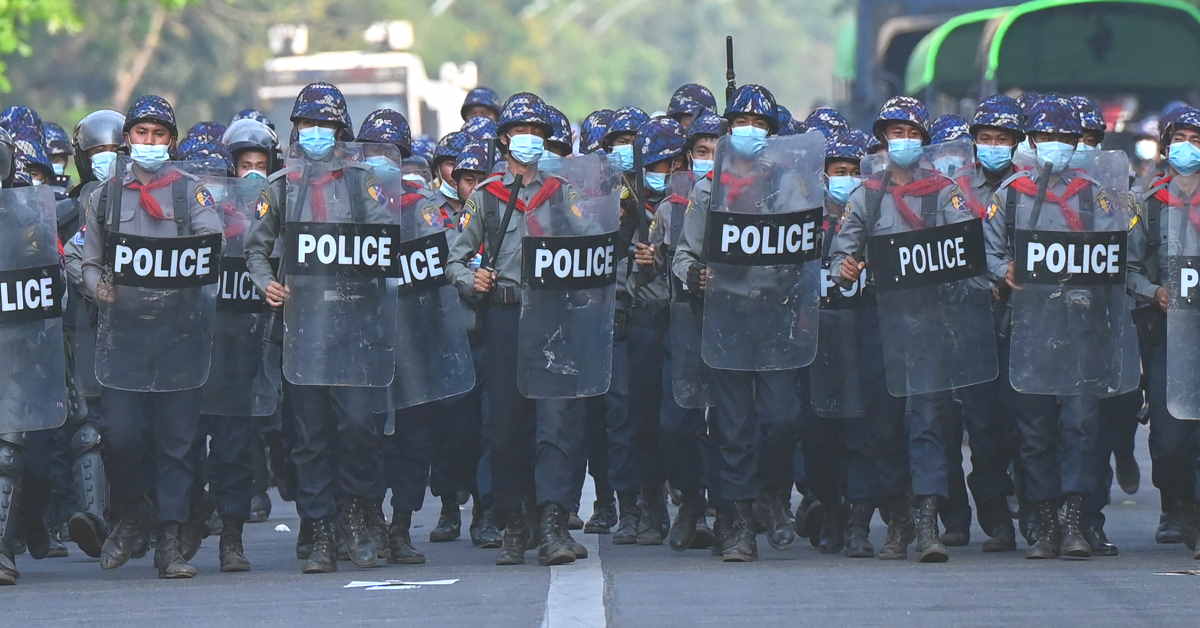Riot police in Myanmar on Friday dispersed hundreds of anti-coup protesters who have rallied daily in the country's largest city against a junta that toppled civilian leader Aung San Suu Kyi.
The country has seen an outpouring of anger and defiance from hundreds of thousands of protesters who have gathered to call for Suu Kyi's release and a return to democracy.
In some cities, security forces have steadily increased their use of force, but in commercial hub Yangon, authorities have exercised restraint, largely relying on barricades and troop presence to prevent gatherings around city landmarks and embassies.
Protesters have bypassed restrictions by moving fluidly through the city, organising around central junctions Hledan and Myaynigone.
But on Friday riot police advanced on the demonstrators – mostly sitting and chanting pro-democracy slogans – and warned them to disperse.
At least two people were arrested after officers cleared the busy traffic artery.
One was a Japanese freelance reporter, Yuki Kitazumi.
"According to eyewitnesses, he was beaten on the head by baton but he was wearing a helmet," his assistant Linn Nyan Htun posted on Facebook, adding that he had reached out to the Japanese embassy.
A police officer denied that Kitazumi was beaten, but confirmed the journalist had been detained at a local police station and would be released after giving a statement.
On a smaller residential street off Myaynigone, some demonstrators assembled makeshift barricades – using barbed wire and stacked tables – to halt police.
Wearing hard hats, protesters shouted the regular anti-junta refrain: "Failure to the dictatorship is our cause, our cause!"
And uptown off Hledan junction, demonstrators sprinted away in alarm as police warned: "If people do not disperse, we will have to disperse by force!"
One frightened protester ran into a nearby house to hide, telling the media that police had deployed stun grenades.
"We had to run," Nyo Hlaing said, adding that some protesters retaliated by shooting projectiles using slingshots at the police.
Reporters on the ground also heard several stun grenades go off with a sharp bang and saw police arrest more people.
As police searched some apartments, residents around Hledan protested by banging pots and pans –an act of defiance against the military regime.
Back on the main traffic junction, officers allowed buses and cars to go through.
Some passengers flashed a three-finger salute – a symbol of resistance borrowed from neighbouring Thailand's pro-democracy movement.
Tensions High
Tensions in Yangon are high, with many rattled after a pro-junta rally was allowed to move through the city's downtown area Thursday.
The pro-military supporters carried slingshots, knives and pipes, which they used to attack people living near the site of their protest, according to reporters and anti-coup residents.
State-run media blamed the clash on pro-democracy demonstrators.
By Thursday night, a Yangon township saw soldiers and police gather to break up a small rally against a junta-appointed municipal administrator, alarming residents who scattered home to avoid arrests after the 8:00 pm curfew.
State-run media reported Friday that authorities had deployed stun grenades and fired live rounds in the air to disperse protesters in Tamwe township.
23 people will "face action according to the law", it said. – AFP
